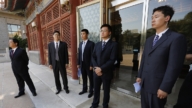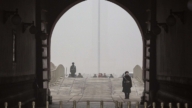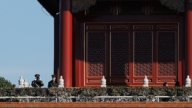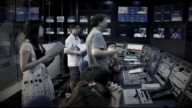【新唐人2012年11月3日訊】中共最高層的權力爭鬥,在經歷了薄熙來案引發的軍隊震盪、習近平神隱14天,和溫家寶家族被揭坐擁巨額財富等事件後,終於到了最後攤牌的時刻。不過這次中共黨代會,能不能像中共宣稱的那樣「勝利召開、勝利閉幕」﹖還頗受外界關注。評論指出,這次中共內部的打鬥比以往任何一次更為激烈,民眾的憤怒也達到了空前的程度,中共這次聚會如何開成所謂「團結的大會、勝利的大會」仍有變數。
中共高官11月1號已經齊聚北京,在北京京西賓館舉行十七屆「七中全會」,為下週的十八大作準備。按照慣例,十八大的會期為7天,隨後舉行「一中全會」,中共新領導班子預計在11月15號誕生。
評論指出,對於中共十八大如何開成團結、勝利的大會,觀察的重點有四個:一是﹕在中共最高層的權力分配中,江澤民、胡錦濤、習近平的親信分別擁有幾席?二是﹕胡錦濤是否留任中央軍委主席?三是﹕毛澤東思想是否退出中共黨章。四是﹕十八大政治報告對民眾期待的政治體制改革將如何表述?
此前,這些方面的傳言在海外媒體已經廣泛流傳,中共新一屆政治局7名常委的名單、分工也有詳盡報導。
不過時政評論家陳破空認為,這次中共的內部鬥爭是文革以來最激烈的一次,目前還不能排除再次出現變數,尤其「差額選舉」制給變數更增添了砝碼。
時政評論家陳破空:「不僅在七中全會上人事名單出現變數,甚至到十八大開幕和閉幕那一天都可能出現人事名單的變數,因為中共黨內的鬥爭是空前的激烈,就是文革後,各界黨代會鬥爭,高層權力鬥爭最激烈的一次。權力鬥爭同時也有路線鬥爭,也就是十八大走甚麼路的問題。」
目前北京隨處可見公安抽查身份證,京西賓館一帶,不但賓館門口有軍人站崗,隨處可見警察維持秩序和臨時封路。
陳破空:「因為目前中共非常沒有安全感,他們把安保工作放在第一位,所以十七屆七中全會也會檢測一下他們目前的保衛工作做的怎樣。因此接下來他們要所謂堅決打贏十八大保衛戰,誓死保衛十八大,因為黨內鬥爭空前的激烈,因此十八大要保障安全,尤其他們內部的安全。」
陳破空認為,對薄熙來的蓋棺定論也是這一次會議的重點。
陳破空:「這個聚會我覺得他們的重點還是中紀委的工作報告,那就是關於薄熙來還有其他部長的處分,但是重點是薄熙來,中紀委的報告估計是個看點。這個看點會列舉薄熙來具體的在黨內違法違紀的證據和罪狀,會說宣佈移交司法機關的處理,我想這是個重要的看點,這個看點就會徹底倒薄,為十八大掃清路障。」
《百度》的搜尋顯示,「十八大勝利召開」的新聞多達88萬條。
中國問題研究人士張健認為,今天中共政權到了風雨飄搖的程度,它還是想用「繆論重復一千遍就是真理」的邏輯來矇騙世人。
中國問題研究人士張健:「無論是今天,哪怕是最後,它都會是勝利、團結,它始終都是以這種形式,一、對國民進行教育,第二是、給自己一個壯膽的作用,它從來不顧及國際上人民,乃至其它民主國家,怎樣看它這無恥的表演。」
陳破空表示,中共的權力鬥爭會體現在人事安排上,而它的路線鬥爭會體現在黨章修改上。有傳言說,可能會刪掉總綱中的「毛澤東思想」﹔也有說要加進胡錦濤的「科學發展觀」﹔還有傳言說,可能會增加一些反腐條例等等,這些的增減都會影響到十八大的政治路線的走向。
北京憲政學者陳永苗曾對《新唐人》表示,民眾關注的是﹕中國以後是走「民主憲政」路線,還是走「集權」路線﹖而不是中共的內鬥中誰來主宰中國。
採訪/梁欣 編輯/劉惠 後製/孫寧
Beijing’s 18th Party Congress: Uncertainty Remains
It is time for a showdown for the top-level infighting of
the Chinese Communist Party (CCP) authorities.
Over the past months,
the regime has suffered a series of shocks.
This includes a major military reshuffle;
Xi Jinping’s sudden Disappearance for 14 days;
and the expose of Wen Jiabao’s
billions-of-dollars of family wealth.
Will the 18th CCP Congress be “convened and concluded
triumphantly” as it has claimed in years of propaganda?
Political observers see the CCP infighting
has reached an unprecedented high level.
Meanwhile, Chinese citizens’ fury has also, peaked.
Therefore, the Party Congress situation remains somewhat in flux.
On November 1, CCP senior officials all gathered in
Beijing to attend the 7th plenary session of the 17th CCP Central Committee.
It is a conference leading up to the 18th Party Congress.
By convention, the Party Congress will last seven days
and subsequently, a first plenary session will be held.
A new CCP team leader is expected to be
decided on November 15.
Commentaries have been focused on four points
in observation of the CCP’s 18th Congress.
1. How many top seats will be taken by cronies of
Jiang Zemin, Hu Jintao and of Xi Jinping?
2. Will Hu Jintao remain in office as head of the military?
3. Will Mao Zedong thought be removed from
the CCP’s Party Constitution?
4. How will the much-anticipated political reform be
expressed in the 18th Party Congress Report?
Earlier on, overseas media disclosed relevant news.
News reports also covered the list of the CCP’s seven
new top politburo leaders and their work assignment.
Critic Chen Pokong says, the CCP infighting has reached
the most intense peak since the Cultural Revolution.
He thinks that variation still cannot be ruled out yet.
The introduction of a multi-candidate election system is
expected to add variation to the final result.
Chen Pokong: “Change may occur on the list of candidates
for top leaders at the 7th plenary session.
It may even not be finalized until the day when the 18th
Party Congress opens or closes.
It’s also involved is a struggle over political line, that is,
which road will the 18th Party Congress leadership take.”
Now policemen scatter over Beijing to examine
the ID of suspicious people.
Soldiers are even mobilized to stand guard at some hotels.
The police are seen everywhere maintaining order and
erecting temporary road blocks.
Chen Pokong: “The CCP feels very insecure right now,
they put security as top priority.
The 7th plenary session’s opening is a chance for them
to test how security is achieved.
Next, they’ll prepare for “safeguarding
the 18th Party Congress”, in their words.
The unprecedented intense infighting has pressured
the CCP to assure security, especially of top leaders.”
Chen Pokong estimates that the regime’s final verdict will
top the agenda of the 7th plenary session.
Chen Pokong: “I think this conference will focus
on the work report made by the Central Discipline Inspection Commission.
That is, the punishment given to Bo Xilai and other
implicated ministers, but the emphasis is on Bo Xilai.
The Commission work statement is a high point, I believe.
It will detail evidence of Bo’s violation of Party discipline.
They will announce the moving of the case
through the legal process.
This high point will completely purge Bo Xilai and
clear the way for the new CCP leadership.”
Search engine Baidu showed over 880,000 search results
for phrases of “the 18th Party Congress and the triumphant opening”.
Zhang Jian, researcher on China issues,
remarks that the CCP rule has been tottering.
However, the regime still attempts to fool the public by
continuing with the philosophy that
‘A lie, repeated a thousand times, becomes a truth.”
Zhang Jian: “No matter whether it’s today or
the day it (the CCP) collapses,
it will always claim that it enjoys victory and solidarity.
This is a means that it has used it’s time to inculcate
the Chinese people and boost its morale.
But it never cares how such a performance proves it’s
shamelessness in the eyes of the international community.”
Chen Pokong interprets that the CCP’s power struggle often
can be seen on its personnel appointment.
The modification of its party constitution can illustrate clearly
its struggle over the political line to be taken.
There are rumors saying that Mao Zedong thought
will be removed from the party constitution,
and replaced by Hu Jintao’s scientific development concept.
Anti-corruption provisions were rumored to be included,
and so on.
All these changes will affect the political line to be held by
the 18th Party Congress, Chen Pokong remarks.
Chen Yongmiao, constitutional scholar in Beijing, says that
the Chinese public’ concern is which path will China take:
to follow constitutional democracy or the concentration
of it’s power?
It is not the issue of CCP infighting, but of how China
will be governed, according to Chen Yongmiao.



























